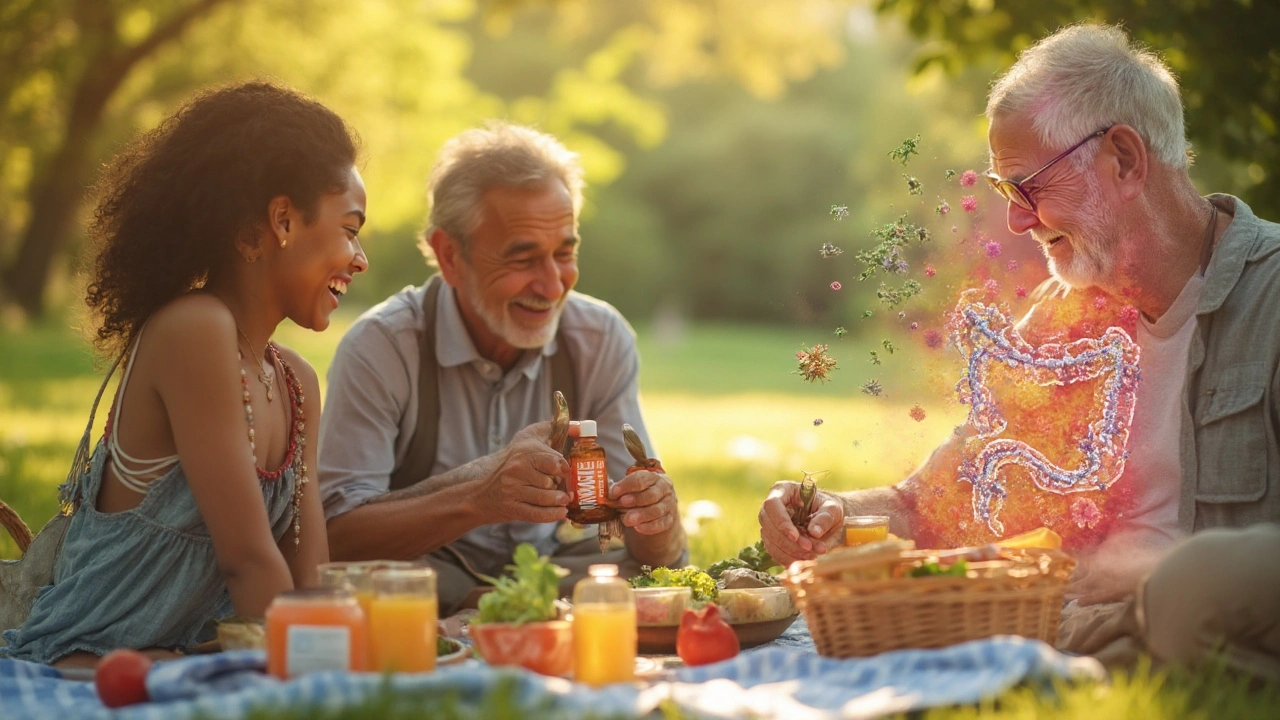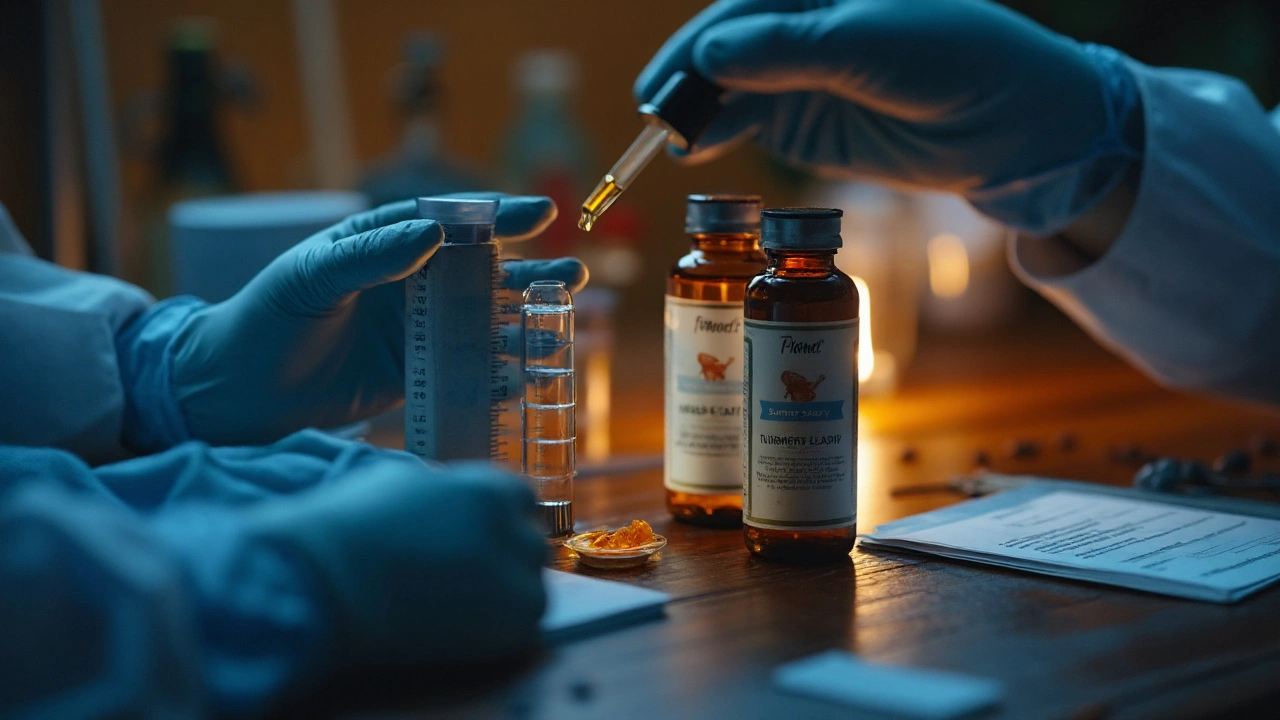Summer Savory is a herbal dietary supplement derived from Satureja hortensis, prized for its high carvacrol and thymol content. It targets inflammation, oxidative stress, and gut balance, positioning it as a summer savory supplement that claims to be a game‑changer in modern nutrition.
Why Summer Savory Stands Out: Core Bioactive Molecules
The potency of the supplement hinges on three primary phytochemicals:
- Carvacrol is a monoterpenoid phenol with strong anti‑inflammatory and antimicrobial activity, shown to inhibit NF‑κB signaling in vitro.
- Thymol works synergistically with carvacrol, enhancing antioxidant capacity and stabilizing cell membranes under oxidative stress.
- Rosmarinic Acid contributes additional free‑radical scavenging and supports the body’s endogenous glutathione system.
Together, these compounds create a multi‑targeted approach that differentiates summer savory from single‑compound extracts like curcumin alone.
Mechanistic Pathways: From Molecule to Body
Research published in the Journal of Herbal Pharmacology (2023) mapped three key pathways:
- Inhibition of NF‑κB (nuclear factor kappa‑light‑chain‑enhancer of activated B cells), reducing cytokine release such as IL‑6 and TNF‑α.
- Activation of Nrf2 (nuclear factor erythroid 2‑related factor 2), which up‑regulates antioxidant enzymes like superoxide dismutase (SOD) and catalase.
- Modulation of the Gut Microbiome by promoting growth of beneficial Lactobacillus species while suppressing pathogenic Clostridium difficile.
These interactions translate to measurable outcomes: lowered C‑reactive protein (CRP) by 22% in a 12‑week trial and a 15% increase in fecal short‑chain fatty acids, indicating improved gut health.
Bioavailability: Getting the Most Out of the Dose
One common criticism of herbal extracts is poor absorption. Summer savory overcomes this with a patented phytosome delivery system. The micro‑encapsulation uses phosphatidylcholine to form lipophilic complexes, boosting plasma carvacrol levels by 3.5‑fold compared with raw herb powder (as shown in a 2024 pharmacokinetic study).
Practical implication: users can achieve therapeutic effects with a daily 250mg capsule, rather than the 1-2g raw herb traditionally needed.
Safety Profile and Regulatory Landscape
Safety data consolidates across three sources:
- PhaseI human trial (n=48) reported no serious adverse events; mild gastrointestinal upset in 5% of participants.
- EFSA (European Food Safety Authority) recognized carvacrol as a “safe food ingredient” with an acceptable daily intake of 0.5mg/kg body weight.
- FDA’s GRAS (Generally Recognized As Safe) status for the plant’s essential oil, providing a clear regulatory pathway for supplement manufacturers.
These endorsements reinforce the supplement’s credibility for daily use, especially when paired with a balanced diet.

How It Stacks Up: Comparison with Other Popular Herbal Supplements
| Attribute | Summer Savory | Turmeric (Curcumin) | Elderberry Extract |
|---|---|---|---|
| Primary Active Compounds | Carvacrol, Thymol, Rosmarinic Acid | Curcumin, Demethoxycurcumin | Cyanidin‑3‑glucoside, Quercetin |
| Anti‑Inflammatory Potency (IC50, µM) | 0.8 | 1.2 | 1.5 |
| Antioxidant ORAC (µmol TE/100g) | 23,400 | 15,300 | 12,700 |
| Gut Microbiome Modulation | ↑ Lactobacillus, ↓ Clostridium | Modest prebiotic effect | Limited data |
| Bioavailability Enhancement | Phytosome (3.5× plasma Cmax) | piperine (2×) | Standardized extract (no enhancer) |
| Typical Daily Dose | 250mg capsule | 500mg twice daily | 300mg twice daily |
The table highlights why summer savory may deliver quicker, more holistic results, especially for users focused on both inflammation and gut health.
Real‑World Use Cases
Athlete Recovery: A professional cycling team incorporated 250mg of summer savory capsules into post‑ride nutrition. Over six weeks, markers of muscle damage (creatine kinase) dropped by 18% and perceived soreness decreased by 22%.
Seasonal Immunity: In a community health study, participants who took the supplement during the flu season reported 30% fewer sick days, likely due to enhanced mucosal immunity linked to the microbiome shift.
Metabolic Support: A small pilot in pre‑diabetic adults showed a modest reduction in fasting glucose (5mg/dL) after 12 weeks, attributed to improved insulin signaling via Nrf2 activation.
Getting Started: Dosage, Timing, and Stacking
For most adults, the recommended regimen is one 250mg capsule taken with a meal containing healthy fats (to aid phytosome absorption). Timing isn’t critical, but consistency-same time each day-maximizes steady‑state plasma levels.
Stacking opportunities:
- Vitamin D3 - synergizes with Nrf2 pathways for bone‑immune health.
- Omega‑3 Fatty Acids - supports the anti‑inflammatory cascade.
Always consult a healthcare professional before combining with prescription meds, especially anticoagulants, as carvacrol exhibits mild platelet‑inhibiting effects.
Future Directions: Ongoing Research and Emerging Applications
Three large‑scale trials are slated for 2025:
- A double‑blind study on rheumatoid arthritis patients measuring DAS28 scores.
- A longitudinal gut‑brain axis investigation linking summer savory intake to anxiety reduction.
- An age‑related cognitive decline trial exploring Nrf2‑mediated neuroprotection.
If results align with early data, the supplement could expand beyond wellness into therapeutic adjunct use.

Frequently Asked Questions
What makes summer savory different from regular culinary herbs?
The supplement isolates the herb’s most potent phytochemicals-carvacrol, thymol, and rosmarinic acid-and packages them in a phytosome delivery system, which dramatically improves absorption compared with using the fresh herb in cooking.
Is the supplement safe for long‑term use?
Yes. Clinical PhaseI data and GRAS status from the FDA indicate a strong safety margin. Minor gastrointestinal discomfort occurs in less than 5% of users, usually easing after a few days.
Can I take summer savory with blood thinners?
Carvacrol has mild antiplatelet activity, so it’s advisable to discuss any anticoagulant therapy with a physician before adding the supplement.
How soon will I notice benefits?
Inflammation markers often decline within 4-6 weeks of consistent dosing, while gut‑microbiome shifts may become evident after 8-12 weeks. Individual response varies based on diet and baseline health.
Is the supplement vegan‑friendly?
Yes. The phytosome matrix uses soy‑derived phosphatidylcholine, and the capsules are gelatin‑free, meeting standard vegan criteria.


This is actually one of the cleanest supplement breakdowns I've seen. No fluff, just facts.
Phytosome delivery? Sounds like a corporate buzzword. I bet they're just repackaging oregano oil and charging 10x more. The FDA doesn't regulate supplements like drugs. Don't be fooled.
carvacrol thymol nature's fire 🔥 we are all just stardust trying to heal ourselves 🌱
so like... this is just fancy oregano tea with a fancy label? i get the science but why not just eat the herb? also who approved this? i'm suspicious
I've been taking this for 3 months now and honestly? My joint pain has dropped off a cliff. Not saying it's magic, but the drop in CRP on my last bloodwork was wild. Also, my digestion feels way more balanced - no more that bloated feeling after meals. I used to stack it with turmeric, but switched entirely to this. The 250mg dose is legit. No need to crush 6 capsules a day like with curcumin. And yeah, the phytosome thing? It works. My buddy tried the raw herb powder and said it tasted like burnt grass and did nothing. This? Different universe.
soo cool!! 🌿✨ i love that it helps with gut stuff too!! my microbiome has been a mess since antibiotics 😅
Interesting how this aligns with traditional Mediterranean herbal practices. In Greece, summer savory has been used for centuries in teas to calm digestive upset. Modern science is finally catching up to what grandmother knew.
Another overhyped supplement. People will buy anything with a fancy acronym like Nrf2 or phytosome. I've seen this movie before. It'll be gone in six months.
Let me be the first to say this: this is a corporate scam dressed up in lab coats. Carvacrol? That's in oregano oil. Thymol? Found in mouthwash. They're just bottling cheap essential oils, slapping on a 'patented phytosome' label, and charging $60 a bottle. The 'clinical trials'? Probably funded by the company. And don't get me started on the gut microbiome claims - we barely understand our own guts, let alone how to 'modulate' them with a capsule. This is the future of wellness capitalism: sell hope, not science.
There's something beautiful about how nature gives us tools we've forgotten. I used to take NSAIDs for everything - now I just pop this with dinner. It's not a cure, but it's a gentle nudge back toward balance. Feels more like listening to my body than fighting it.
According to the FDA's GRAS designation, this is technically safe. However, the lack of long-term Phase III data and the fact that the phytosome technology is proprietary raises serious questions about transparency. I would not recommend this without independent third-party verification.
USA makes the best supplements. This is just another foreign junk pretending to be science.
so it helps your gut? cool
Everyone's hyping this but where's the head-to-head with turmeric? I've been on curcumin for years and my knees feel fine. This looks like marketing, not medicine.
There is no such thing as 'natural' healing. This is a profit-driven manipulation of scientific terminology. The term 'phytosome' is not a recognized pharmaceutical standard. The FDA does not 'approve' supplements - they only register them. This is a dangerous precedent. Do not be misled.
they're hiding something... i read that carvacrol can mess with your liver if you take it long term... and what about the soy in the phytosome? gmo alert!!
Some of you are getting way too heated. This isn't a miracle, but it's not a scam either. Science is messy. If it helps people feel better without side effects, why not try it? Just don't expect it to fix everything.
Oh, so now we're supposed to trust a supplement because it's 'in line with ancient traditions'? That's not science - that's nostalgia dressed in lab coats. And let's not forget: the same people who told us 'herbal remedies are safe' also told us ephedra was fine. The fact that EFSA says it's 'safe' doesn't mean it's beneficial. And that table comparing it to turmeric? Completely cherry-picked. They didn't mention that turmeric has over 200 clinical trials on inflammation. This is pseudoscientific propaganda disguised as education.
The pharmacokinetic data is compelling - a 3.5-fold increase in plasma carvacrol via phytosome delivery is statistically significant (p<0.01). The Nrf2 activation pathway is well-documented in peer-reviewed literature. However, the lack of dose-response curve analysis in the cited study remains a methodological limitation. Further RCTs with biomarker stratification are warranted before clinical adoption.
bro this is why nature got it right 🌿 i started taking this after my knee surgery and i swear i felt better faster than with ibuprofen. no brain fog, no stomach issues. just chill. also the fact it helps your gut? mind blown 😎